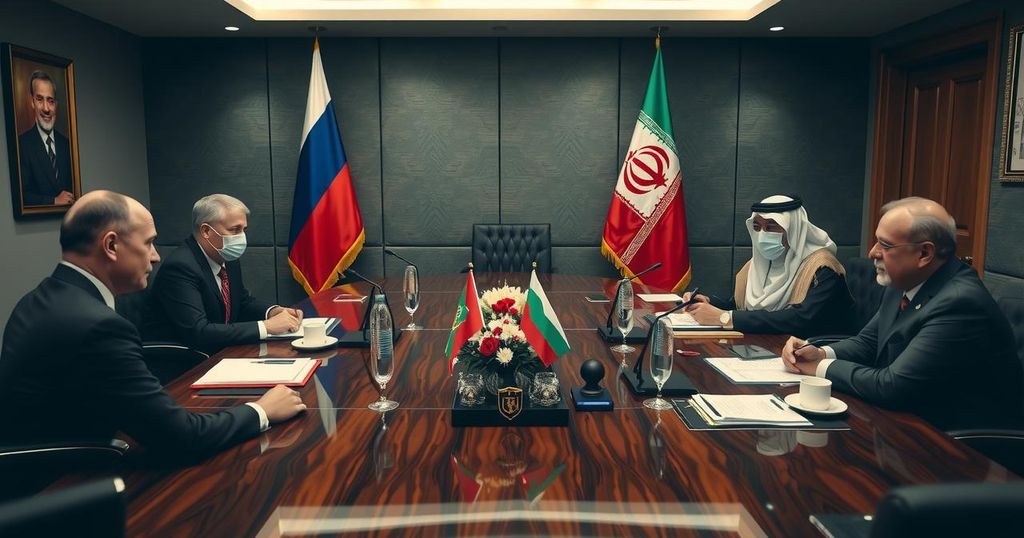The Implications of Russian Recruitment of Yemeni Mercenaries through the Houthis
Recent reports indicate that Russia has recruited Yemeni men, with the assistance of Houthi rebels, to compensate for its losses in Ukraine. This recruitment not only provides financial benefits to the Houthis and training opportunities for recruits but also enhances the Houthis’ role in Iran’s regional strategy. Additionally, Moscow’s support fosters destabilizing actions in the Red Sea while maintaining relations with Gulf states and signaling a strategic challenge to U.S. influence in the region.
Recent developments highlight Russia’s strategy to recruit Yemeni men, facilitated by collaboration with the Houthi rebels, to bolster its military capabilities amidst heavy losses in Ukraine. These Yemeni recruits, drawn by promises of lucrative salaries and the potential for Russian citizenship, are being integrated into the Russian armed forces through Houthi intermediaries. This recruitment initiative not only serves to alleviate personnel shortages for Russia but also financially benefits the Houthis, granting Yemeni fighters access to military training while further establishing the Houthis as key players within Iran’s network of proxy forces in the Middle East.
The significance of this relationship has escalated following the October 2023 Hamas attack on Israel, positioning the Houthis as a pivotal element of Iran’s “Axis of Resistance” against Western influence. Reports suggest Iran is negotiating arms partnerships with Russia, potentially including advanced weaponry deliveries to the Houthis, while Moscow has expressed interest in providing small arms and intelligence support to enhance Houthi military operations, particularly against maritime targets in the Red Sea. Such moves facilitate Russia’s strategic objective of pressuring Western interests by destabilizing crucial maritime routes.
Russia’s interaction with the Houthis, however, is characterized by pragmatic opportunism rather than a formal alliance. Moscow aims to leverage the relationship to extend its influence in the region, specifically over strategic Gulf partners like the UAE and Saudi Arabia, while avoiding direct confrontations that could jeopardize those ties. This calculated support allows Russia to fortify its geopolitical stance while maintaining diplomatic engagements with rival factions in Yemen.
The United States and its allies need to remain vigilant regarding the developing alliance between Russia and the Houthis, as it could broaden the Houthis’ capability to disrupt international maritime operations, exacerbating regional tensions. Even without significant advanced weapon systems, Russia’s potential support in military manufacturing could enhance Houthi self-sufficiency, granting the group greater autonomy from Iranian support and increasing the likelihood of aggressive actions.
The recent recruitment of Yemeni mercenaries by Russia signals the strengthening of ties between Moscow and the Houthi rebels amid shifting dynamics in the Middle East, particularly following increased tensions related to the Hamas assault on Israel. The Houthis, aligned with Iran’s broader resistance strategies, stand to gain militarily and financially from their relationship with Russia, which is concurrently addressing its own military needs due to ongoing losses in Ukraine. This strategic collaboration enables both parties to challenge U.S. interests in the region by consolidating their resources and influence.
In conclusion, the recruitment of Yemeni fighters by Russia through the Houthis exemplifies an evolving strategic partnership that benefits both parties amidst regional conflicts. For Russia, it provides additional manpower for its military while enhancing its geopolitical leverage in the Middle East. Conversely, the Houthis consolidate their position within Iran’s proxy network, posing a significant threat to U.S. interests and security in the region. This cooperation is indicative of a broader geopolitical maneuvering aimed at countering Western influence, suggesting that the situation warrants close observation by international stakeholders.
Original Source: www.atlanticcouncil.org




Post Comment